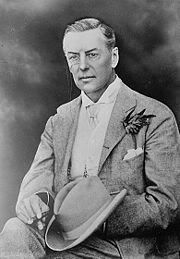
Joseph Chamberlain: famous for his orchids (grown in hothouses by his own horticulturalist), was a man for whom custom and ceremony held great importance.Uniformity and conformity in dress naturally belong to the more ceremonious times, before the Second World War, than ours. Then people still dressed for every occasion during each day and then changed into evening dress for what was the chief civil ceremony of the day: dinner and the social entertainments of the evening. These days, of course, with broken families and 'telly-dinners' there is little ceremony left and a handful of aristocrats, the members of the professions and the middle and top end of the business classes are amongst the few left still even to wear a coat and tie on a regular basis. However, there are enduring enclaves of the properly dressed, even if their habits are less intense than they once were. For them, as occasion may require, morning dress, a shooting suit, full evening dress, a dinner jacket (and so on) have never declined to the state of mere 'costume'. However, there are those who claim that these outfits have become 'costume': they claim it, more often than not, because they daren't wear these outfits and would feel (and appear) ridiculous if they did. Accordingly, they enjoy raining (sometimes with rather bad temper), on other people's parades and recommend the prissy selection of token items, as 'a nod to the occasion'; by which, of course, they cock their snooks. Overall, thank Goodness that there is still enough custom and ceremony left in human existence to allow us to celebrate our tribal groupings; (at least) correctly dressed and (with hope) well-dressed. As W. B. Yeats said (in A Prayer For My Daughter):
"Ceremony's a name for the rich horn,
And Custom for the spreading laurel tree."













No comments:
Post a Comment